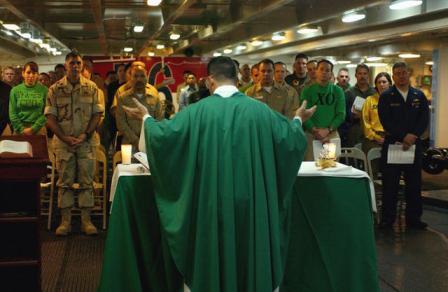STOKING FIRE: Ultra-Conservative Doctrine May Be the Reason for Unreported Sexual Crimes in the Military
Part of the blame for the reluctance to report sexual crimes in the military rests with an unsympathetic military chaplaincy, one of the few places soldiers, sailors, reservists, national guardians, and marines can turn for counseling.

The cliché tells us that war is hell, but for female enlistees, the war on the domestic front—within their units–trumps that of the battlefield. In fact, a recent Veteran’s Administration survey revealed statistics that should have turned the military on its warmongering head: 30 percent of female vets told the interviewers that they had been assaulted by a male colleague and/or supervisor. Worse, 14 percent reported having been gang raped and 20 percent reported having been raped more than once.
Shockingly, these figures may be low since under-reporting of sexual crimes is known to be endemic.
Part of the blame for the reluctance to report rests with an unsympathetic military chaplaincy, one of the few places soldiers, sailors, reservists, national guardians, and marines can turn for counseling. According to the St. Louis Post-Dispatch, 20 percent of today’s 3000 military chaplains were trained at the ultraconservative Liberty Baptist Theological Seminary in Lynchburg, Virginia. Founded by Rev. Jerry Falwell and Elmer Towns in 1971, the school bills itself as the world’s largest seminary, something it attributes to its “conservative doctrinal position, its sound grounding in Bible teachings, and its reflection of core Christian essentials.” The school’s website clears up any definitional murkiness: “Liberty is committed to changing the entire world for Jesus Christ, first changing the world with its students, then equipping them to change the world around them.”
While most of its students are undoubtedly attracted to this mission, others attend Liberty because tuition is low: $1900 a term for residential students and $2200 for distance learners. During the 2011-2012 year, nearly 9000 students from 46 countries registered for online classes; of them, more than 1000 hope to complete the 72-credit program and become military chaplains. A severe shortage of armed forces clerics—an article posted on Times Union.com in February 2011 blames the deficiency on the military’s rigid age and physical requirements and on the reluctance of pastors/rabbis/imams to exchange the comforts of home for combat—will likely make this dream come true for many of them.
That this bodes badly for women and the LGBTQ community is a given.
Rebecca Turner, Executive Director of Faith Aloud, a St. Louis-based prochoice, pro-LGBTQ group, notes that, “There is a clear pattern within fundamentalist churches to blame the victim. For them Adam and Eve is historical fact and even today the woman is seen as the temptress and the man the fool who can’t resist her feminine wiles.” Fundamentalist chaplains, she continues, will hear a woman say that she was attacked and assume that she did something to provoke or warrant it. “The military is still a predominantly male, macho culture,” she says. “Add chaplains trained in very conservative ideology and you have the perfect storm of victim blaming for women who step forward. “
Rev. John Gundlach served as a United Church of Christ chaplain for 27 years and is now part of the Religion and Faith Program of the Human Rights Campaign. He has personally witnessed the evangelical ascension and says that the declining number of mainline Christians—Turner estimates that 90 percent of today’s Christians are fundamentalist—opened the barracks door to them.
“Some super evangelicals see the military as their own government-paid mission field,” Gundlach begins. “They are there to proselytize; that’s their mandate. Even though proselytizing is prohibited, it takes place all the time.“
In addition, Gundlach says that many Liberty-trained pastors are incompetent. “They take courses online and don’t get the practical training and hands-on experience they need,” he says.
Then there’s the issue of ideology. “Some male pastors lord over women. Some talk about ‘the gay lifestyle,’ which they see as a sin to be condemned. Even though they say they love the sinner and hate the sin, this viewpoint doesn’t help the individual who needs pastoral care and counseling,” Gundlach continues. “They claim it violates their religious freedom to have to provide care for lesbian or gay people, or to offer rites and sacraments to them.”
Of course, now that LGBTQ service members can be out, marriage is the first sacrament that comes to mind. But pastors can also be called upon to perform baptisms, confirmations, last rites, bar and bat mitzvahs, funerals, and provide counseling to enlistees and their families. Within a month of DADT’s repeal, Gary Pollitt, a spokesperson for the Military Chaplain’s Association, assured clergy that they “take cues from their religious order, not the DoD.” Those fearful of having to marry Lisa and Joan or Omar and Stephen need not worry. “Just because the Department of Defense says that gay marriage can happen, chaplains perform such rites in keeping with their ecclesiastical authorization. Period,” Pollitt told them.
As for rape, groping, or sexually offensive comments, the MCA has been appallingly silent.
“Liberty-trained chaplains are just one piece of a larger problem,” Rev. Gundlach concludes. “The evangelical Christian piece is huge. Their influence in the Pentagon and the military academies is enormous and will not be easy to overcome. It’s not just chaplains but senior officials and admirals who have been influenced by these conservative groups.”
Sharon Groves, Director of HRC’s Religion and Faith Program, sees the challenge as attracting seminarians who are sensitive to women and LGBTQ people, preachers who are willing to uphold the Code of Ethics promulgated by the 4000-member Association of Professional Chaplains: “Members shall serve all persons without discrimination regardless of religion, faith group, race, ethnicity, sexual orientation, gender, age, or disability… [and] refrain from imposing doctrinal positions or spiritual practices on persons whom they encounter in their role as chaplains.”
Now, wouldn’t that be something for the Amen Corner to celebrate?
